| Listing 1 - 7 of 7 |
Sort by
|
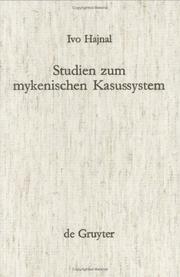
ISBN: 3110139863 3110888327 9783110139860 Year: 1995 Volume: 7 7 Publisher: Berlin: de Gruyter,
Abstract | Keywords | Export | Availability | Bookmark
 Loading...
Loading...Choose an application
- Reference Manager
- EndNote
- RefWorks (Direct export to RefWorks)
-Inscriptions, Linear B. --- Linear B inscriptions --- Minoan writing --- Greek language --- Inscriptions, Linear B --- Inscriptions, Greek --- Inscriptions, Hieroglyphic --- Case --- Alphabet --- Inscriptions, Linear B. --- Case. --- Greek language - Case.
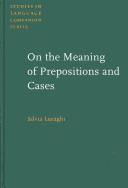
ISSN: 01657763 ISBN: 9027230773 1588114333 9786612160721 1282160729 9027295913 9781588114334 9789027295910 9789027230775 Year: 2003 Volume: 67 Publisher: Amsterdam Philadelphia J. Benjamins Pub. Co.
Abstract | Keywords | Export | Availability | Bookmark
 Loading...
Loading...Choose an application
- Reference Manager
- EndNote
- RefWorks (Direct export to RefWorks)
Prepositions and cases constitute a fruitful field of research for semantics. The historical development of their meaning can shed light on the relations among the semantic roles of participants and on the organization of conceptual space. Ancient Greek allows an in-depth study of such development. The book, based on a wide, diachronically ordered corpus, aims at providing a usage-based analysis of possible patterns of semantic extension, including the mapping of abstract domains onto the concrete domain of space. An analysis of the Greek data further highlights the interplay between specific spatial relations and the internal structure of the entities involved, and shows how case semantics may account for differences on the referential level, rather than merely express clause internal relations. The first chapter contains a typologically based discussion of semantic roles, which sets the language-specific analysis in a wider framework, showing its general relevance and applicability.
Lexicology. Semantics --- Classical Greek language --- Grammar --- Greek language --- Prepositions --- Semantics --- Case --- Prepositions. --- Semantics. --- Case. --- LANGUAGE ARTS & DISCIPLINES --- Linguistics / Semantics --- Greek & Latin Languages & Literatures --- Languages & Literatures --- Greek language - Prepositions. --- Greek language - Semantics. --- Greek language - Case.
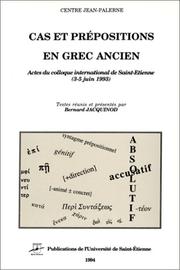
ISBN: 286272047X 9782862720470 Year: 1994 Volume: 12 Publisher: Saint-Étienne: Université de Saint-Étienne,
Abstract | Keywords | Export | Availability | Bookmark
 Loading...
Loading...Choose an application
- Reference Manager
- EndNote
- RefWorks (Direct export to RefWorks)
Greek language --- Case --- Congresses. --- Prepositions --- -Greek language --- -Classical languages --- Indo-European languages --- Classical philology --- Greek philology --- -Congresses --- -Case --- Classical languages --- Case&delete& --- Congresses --- Prepositions&delete& --- Greek language - Case - Congresses. --- Greek language - Prepositions - Congresses.
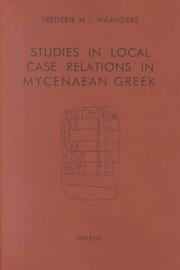
ISBN: 905063107X 9789050631075 Year: 1997 Publisher: Amsterdam : Gieben,
Abstract | Keywords | Export | Availability | Bookmark
 Loading...
Loading...Choose an application
- Reference Manager
- EndNote
- RefWorks (Direct export to RefWorks)
Inscriptions, Linear B. --- Greek language --- Case. --- Locative constructions. --- Inscriptions, Linear B --- Linear B inscriptions --- Minoan writing --- Inscriptions, Greek --- Inscriptions, Hieroglyphic --- Classical languages --- Indo-European languages --- Classical philology --- Greek philology --- Case --- Locative constructions --- Alphabet --- Greek language - Case. --- Greek language - Locative constructions.

ISBN: 3525262345 9783525262344 Year: 2005 Volume: 44 Publisher: Göttingen: Vandenhoeck und Ruprecht,
Abstract | Keywords | Export | Availability | Bookmark
 Loading...
Loading...Choose an application
- Reference Manager
- EndNote
- RefWorks (Direct export to RefWorks)
Lokalpartikeln sind eine Wortart, die nicht auf die Funktion von Adverb oder Adposition (= Prä- bzw. Postposition) festgelegt ist, sondern in der jeweiligen syntaktischen Umgebung adverbial oder adpositional fungiert; ferner können Lokalpartikeln als Präverbien in Verbalkomposita lexikalisch gebunden werden. Um welche dieser drei Verwendungsweisen es sich an jeder einzelnen Belegstelle handelt, wird im Besonderen Teil der Untersuchung dargestellt, während der Allgemeine Teil die syntaktische und semantische Methodik zur Beantwortung dieser Frage präsentiert. Moderne Linguistik wird hier auf das archaische Griechisch der homerischen Epen angewandt, das die typologische Charakteristik trikasueller Lokalpartikeln aufweist.
Greek language --- Particles. --- Case. --- Homer --- Language --- Criticism and interpretation --- Classical languages --- Indo-European languages --- Classical philology --- Greek philology --- Case --- Particles --- Homeros --- Homère --- Criticism and interpretation. --- Language. --- Homerus --- Hóiméar --- Hūmīrūs --- Gomer --- Omir --- Omer --- Omero --- Ho-ma --- Homa --- Homérosz --- האמער --- הומירוס --- הומר --- הומרוס --- هومر --- هوميروس --- 荷马 --- Ὅμηρος --- Гамэр --- Hamėr --- Омир --- Homero --- 호메로스 --- Homerosŭ --- Homērs --- Homeras --- Хомер --- ホメーロス --- ホメロス --- Гомер --- Homeri --- Hema --- Pseudo-Homer --- Pseudo Omero --- Greek language - Particles. --- Greek language - Case. --- Homer - Language --- Homer - Criticism and interpretation
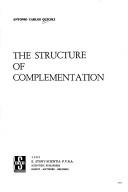
ISBN: 9064391653 9064391602 1299676863 9027271267 9789064391651 9789027271266 9781299676862 Year: 1982 Volume: 3 Publisher: Ghent E. Story-Scientia
Abstract | Keywords | Export | Availability | Bookmark
 Loading...
Loading...Choose an application
- Reference Manager
- EndNote
- RefWorks (Direct export to RefWorks)
The study of complementation has received considerable attention in generative studies. Following Rosenbaum's (1967) pioneering study of the English complement system, there are extensive studies by Lakoff (1965), Ross (1967), Perlmutter (1971) and a large number of publications. More recent detailed studies are Emonds (1970) and Bresnan (1972) . These studies have increased enormously the body of factual knowledge about the complement system of English, and about the phenomenon of complementation in general. As a consequence there are a number of empirical hypotheses about the structure of human languages which must now be tested against facts of different languages. Of these hypotheses, perhaps the most interesting is that the grammars of all languages make use of the principle of the transformational cycle. Testing this hypothesis constitutes one of the main concerns of the present book. Furthermore, these studies have also raised numerous interesting empirical issues of great importance for linguistic theory, most of which are still awaiting fresh evidence from different languages in order to be settled. This study is directed towards resolving some of these issues by adducing relevent data, primarily from Portuguese.
Portuguese language --- Parecer (The Portuguese word) --- Greek language --- Syntax --- Complement --- Agreement --- Case --- Parecer (The Portuguese word). --- Agreement. --- Case. --- Complement. --- Syntax. --- Grammaire --- Grammatica --- Linguistique --- Portugais (langue) --- Portugees --- Taalkunde --- 806.90 --- -Greek language --- -Parecer (The Portuguese word) --- -Portuguese language --- 806.90 Portugees. Portugese taalkunde --- Portugees. Portugese taalkunde --- Romance languages --- Classical languages --- Indo-European languages --- Classical philology --- Greek philology --- Etymology --- -806.90 Portugees. Portugese taalkunde --- Grec (Langue) --- Portugais (Langue) --- Cas --- Syntaxe --- Grammar, Generative. --- Portuguese language - Syntax --- Portuguese language - Complement --- Portuguese language - Agreement --- Greek language - Case --- Greek language - Agreement
Book
ISBN: 9065693955 9789065693952 Year: 1988 Volume: 125 Publisher: Brussel : Koninklijke akademie voor wetenschappen, letteren en schone kunsten van Belgie,
Abstract | Keywords | Export | Availability | Bookmark
 Loading...
Loading...Choose an application
- Reference Manager
- EndNote
- RefWorks (Direct export to RefWorks)
Greek language --- Case. --- Transitivity. --- Grammar --- Classical Greek language --- Homer --- Transitivity --- Case --- 807.5-5 --- 875 HOMERUS --- 875 HOMERUS Griekse literatuur--HOMERUS --- Griekse literatuur--HOMERUS --- 807.5-5 Grieks: grammatica --- Grieks: grammatica --- Classical languages --- Indo-European languages --- Classical philology --- Greek philology --- Homerus --- Hóiméar --- Hūmīrūs --- Homeros --- Gomer --- Omir --- Omer --- Omero --- Ho-ma --- Homa --- Homérosz --- האמער --- הומירוס --- הומר --- הומרוס --- هومر --- هوميروس --- 荷马 --- Ὅμηρος --- Гамэр --- Hamėr --- Омир --- Homère --- Homero --- 호메로스 --- Homerosŭ --- Homērs --- Homeras --- Хомер --- ホメーロス --- ホメロス --- Гомер --- Homeri --- Hema --- Pseudo-Homer --- Pseudo Omero --- Language. --- Language --- Syntax --- Case grammar --- Homerus, --- Greek language - Transitivity --- Greek language - Case --- Grec (langue) --- Grammaire relationnelle --- Homere, poete epique grec, vers le 9e siecle av. j.-c. --- Langue --- Grammaire --- Grammatica --- Grieks
| Listing 1 - 7 of 7 |
Sort by
|

 Search
Search Feedback
Feedback About UniCat
About UniCat  Help
Help News
News